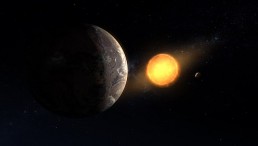Ryan Wallace
WHO Declares Nigeria Ebola Free—Here’s How They Did It
Forget Ebola, Journey to Mars May Be More Lethal Death Sentence
A Magnetic Topsy Turvy Earth—When North Becomes South
New Study Says Travelers May Bring Ebola, But What About the Air?
In United States 21 Days Signals Waning Ebola Infection
Not Just NASA ‘Ducks & Covers’—Comet Siding Spring
ESA Asks Public to Name Philae Landing Site of Comet 67P This November
NASA’s Spacecrafts ‘Duck And Cover’ Behind Mars as Comet Passes Through
UN Messenger of Peace Donates Millions Towards Ocean Conservation—Leonardo DiCaprio
Taking A Bite Out of Sunlight—US Expects A Partial Solar Eclipse
How the Milky Way Dominates the Stellar Block—Dwarf Galaxies, Get Out of the Way
On Droughts and Dust Bowls—California Looks Back to 1934
How A Parasite Became a Power House—The Tale of Mitochondria
New Research Started After Rare Beaked Whale Washed Ashore Near Sydney
Most Popular

'Ugliest Man' With Physical Deformity Finds Love Three Times; What Is Fibrodysplasia Ossificans Progressiva (FOP)?

Sunscreen Myths Debunked; Expert Warns Against 'Dangerous' Sun Protection Ideas That Only Puts One at Added Risk

Earth's Magnetic Field Nearly Collapsed 600 Million Years Ago, Sparking Evolution of More Complex Life

Taam Ja' Blue Hole: The Deepest Known Underwater With Hidden Caves and Tunnels


!['Cosmic Glitch' in Einstein's Theory of General Relativity Could Be Explained in This New Scientific Tweak [Study]](https://1721181113.rsc.cdn77.org/data/thumbs/full/53435/258/146/50/40/cosmic-glitch-in-einsteins-theory-of-general-relativity-could-be-explained-in-this-new-scientific-tweak-study.jpeg)


